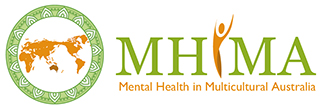MHIMA - FRAMEWORK FOR MENTAL HEALTH IN MULTICULTURAL AUSTRALIA: TOWARDS CULTURALLY INCLUSIVE SERVICE DELIVERY
WORKERS - IMPLEMENTATION GUIDE - Workforce
Australia needs a mental health workforce that is able to respond to the diversity of the population. We must develop an informed, skilled, flexible and reflective workforce with strong leadership in order to deliver successful strategies that improve access, quality of care and recovery services for CALD clients.
Standard 3 of the National Practice Standards for the Mental Health Workforce (2013) addresses 'awareness of diversity'. It articulates the knowledge, skills and attitudes required of the mental health workforce practicing in a diverse society . In order to provide clinically competent mental health care in a culturally diverse society, the workforce must go beyond culturally aware to being culturally responsive.
Clinicians and other staff responding to cultural and language diversity need to be:
- Flexible in their approach
- Able to adapt assessment processes and interventions to achieve equitable clinical outcomes across all population groups.
Cultural responsiveness needs to be integrated into clinical training programs in mental health and suicide prevention, as well as broader areas of engagement, and promotion and prevention activities. While the workforce require the knowledge, skills and awareness to provide culturally responsive mental health care, services need to support them to undertake this training and to provide a work environment where the training can be put into practice.
Cultural responsiveness must be applied at all the levels of service delivery, from individual treatment through to the broader system. As stated in the National Mental Health Workforce Strategy (2011), ongoing cultural competency training, rather than brief awareness sessions, is the most appropriate strategy for building workforce capacity.
Systemic issues also need to be addressed to support this skilled workforce. Critical outcomes for the framework include:
- The development of leadership in multicultural mental health
- Improvements in evidence based policy input
- Systematic advocacy
- The establishment of informed networks
- Close collaboration with government and non-government services
- Liaison with workforce initiatives, professional bodies, and the tertiary sector to ensure the future workforce has an awareness of how to apply their professional knowledge and skills to a multicultural population.
KEY OUTCOME AREA 4: WORKFORCE
A culturally responsive and diverse mental health workforce which is supported to deliver culturally and linguistically inclusive practice
-
Outcome Indicator 4.1 Improved knowledge and skills in cultural responsiveness in the mental health workforce
-
Outcome Indicator 4.2 Improved knowledge and skills about seeking specialist cultural assistance and input when required.
Level Strategy
Good Practice Examples Referencing Entry I accept and respect the benefits of seeking specialist cultural assistance and input when required. NSMHS:
4.4Developing I utilise processes and networks to seek advice from cultural informants and specialist transcultural mental health services when required. Advanced I evaluate and reflect on my work with specialist cultural advisors and informants, leading to improvement in my practice. -
Outcome Indicator 4.3 Improved skills in working with interpreters, and adherence to language services policies in mental health.
Level Strategy Good Practice Examples Referencing Entry I accept and respect the importance of working with interpreters and adhering to a language services policy in working with CALD consumers and carers. NSMHS:
4.5Developing I adhere to a language services policy when working with CALD consumers and carers, and work with interpreters when required. Advanced I regularly review and improve how effectively I work with interpreters, based on CALD consumer and carer satisfaction.
Previous Page
